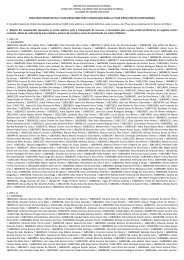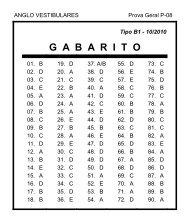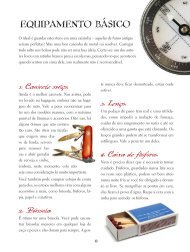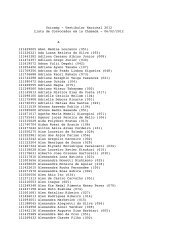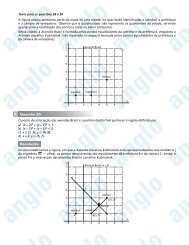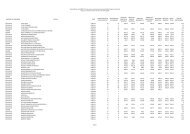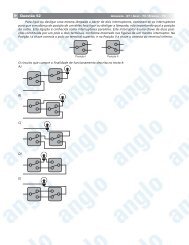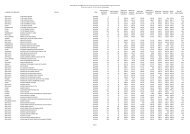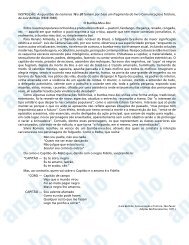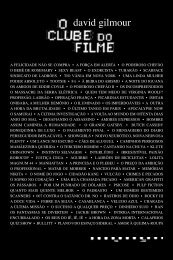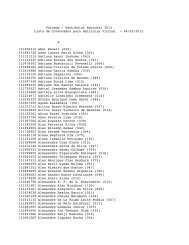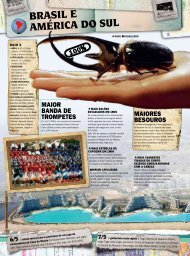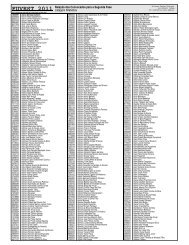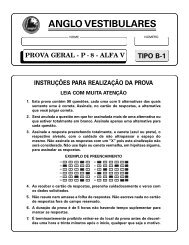o anglo resolve a prova da 1ª- fase da FUVEST-2010 ... - Veja
o anglo resolve a prova da 1ª- fase da FUVEST-2010 ... - Veja
o anglo resolve a prova da 1ª- fase da FUVEST-2010 ... - Veja
Create successful ePaper yourself
Turn your PDF publications into a flip-book with our unique Google optimized e-Paper software.
Texto para as questões 39 e 40As everybody knows, if you do not work out, your muscles get flaccid. What most people don’t realize,however, is that your brain also stays in better shape when you exercise.Surprised? Although the idea of exercising cognitive machinery by performing mentally demandingactivities — popularly termed the “use it or lose it” hypothesis — is better known, a review of dozens of studiesshows that maintaining a mental edge requires more than that. Other things you do — including participatingin activities that make you think, getting regular exercise, staying socially engaged and even having a positiveattitude — have a meaningful influence on how effective your cognitive functioning will be in old age.www.scientificamerican.com/article. Acessado em 06/07/2009. A<strong>da</strong>ptado.▼Questão 39O texto informa quea) exercícios físicos são benéficos para o corpo e para a saúde mental.b) as pessoas não se dão conta <strong>da</strong> importância de músculos fortes.c) o cérebro é muito pouco exercitado por pessoas que não trabalham.d) todo mundo deveria exercitar-se diariamente.e) grande parte <strong>da</strong>s pessoas preocupa-se apenas com a aparência física.ResoluçãoLê-se no primeiro parágrafo: “Como todo mundo sabe, se você não faz exercício físico, seus músculos ficamflácidos. O que a maioria <strong>da</strong>s pessoas não percebe, no entanto, é que o cérebro também se beneficia quandovocê faz exercícios físicos.”Resposta: a▼Questão 40Segundo o texto, o bom funcionamento de nosso cérebro na velhice depende, entre outros fatores,a) <strong>da</strong>s per<strong>da</strong>s e ganhos que vivenciamos ao longo <strong>da</strong> vi<strong>da</strong>.b) <strong>da</strong> herança genética que trazemos conosco.c) <strong>da</strong>s mo<strong>da</strong>li<strong>da</strong>des de exercícios físicos que realizamos.d) <strong>da</strong> complexi<strong>da</strong>de de exercícios intelectuais a que somos expostos.e) de nosso engajamento em ativi<strong>da</strong>des intelectuais e sociais.ResoluçãoLê-se no seguinte trecho do segundo parágrafo: “... participating in activities that make you think, gettingregular exercises, staying socially engaged (...) have a meaningful influence on how effective your cognitivefunctioning will be in old age.”Resposta: e▼Questão 41Leia a charge a seguir:CARO PAPAI NOEL,POR QUE A SUA ORGANIZAÇÃO FICALOCALIZADA NO POLO NORTE?EU APOSTO QUE É POR SALÁRIOSBAIXOS DOS DUENDES, PADRÕESECOLÓGICOS MAIS BAIXOS EINCENTIVOS FISCAIS. É ESSEMESMO O EXEMPLO QUE VOCÊQUER DAR PARA NÓS CRIANÇASIMPRESSIONÁVEIS?O MEU PLANO É COLOCÁ-LONA DEFENSIVA, ANTESDELE CONSIDERAR OQUANTO EU FUI BOM.Fonte: Bill Watterson. Universal Press/Best News, 1996. A<strong>da</strong>ptado.<strong>FUVEST</strong>/<strong>2010</strong> – 1ª- FASE20ANGLO VESTIBULARES



